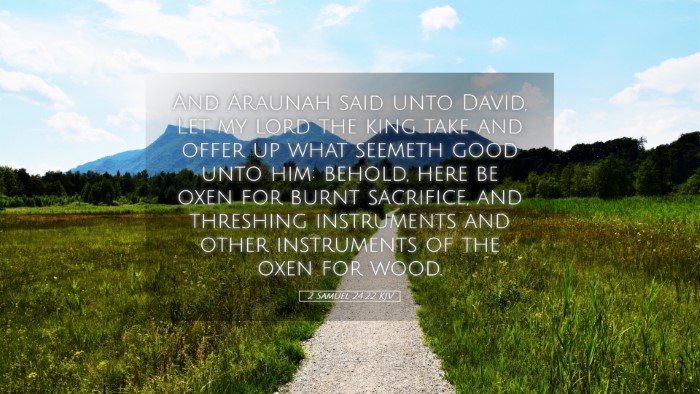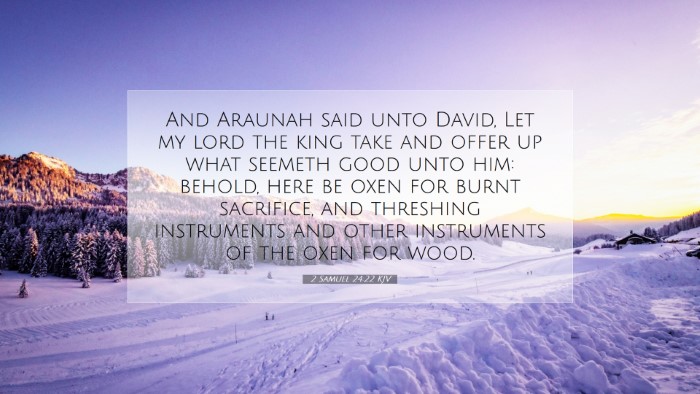Commentary on 2 Samuel 24:22
Verse: "And Araunah said unto David, Let my lord the king take and offer up what seemeth good unto him: behold, here be oxen for burnt sacrifice, and threshing instruments and other instruments of the oxen for wood." (2 Samuel 24:22, KJV)
Contextual Overview
This verse occurs within the narrative of David's census of Israel, an act that led to God’s anger and the eventual punishment of Israel through a pestilence. After David appeals to God and seeks to atone for his sin, he encounters Araunah, a Jebusite, at the site where David is instructed to build an altar to God.
Insights from Matthew Henry
Matthew Henry notes that Araunah’s response to David illustrates profound humility and generosity. Araunah, a king among the Jebusites, willingly offers his resources to David, demonstrating not only submission to the king but a readiness to support the King of kings. His action reflects a deep respect for Israel's monarchy and an understanding of the importance of sacrificial offerings in approaching God.
Henry also elaborates that God desires sacrifice that stems from a contrite heart rather than mere physical offerings. Araunah’s offer was substantial, but David emphasizes in later verses the importance of purchasing the land, for he would not offer to God that which costs him nothing (2 Samuel 24:24). This underscores that true worship involves personal investment and sacrifice.
Insights from Albert Barnes
Albert Barnes provides a detailed exposition on the significance of Araunah's willingness to provide the oxen and instruments for the sacrifice. He emphasizes the cultural context in which this took place; offering sacrifices was a vital part of Hebrew religion, and Araunah’s readiness to assist David signifies his acknowledgement of the necessity of atonement and worship.
Barnes highlights that David's acceptance of Araunah's offer was conditional on the principle of genuine sacrifice. David's insistence on paying for the land indicates the necessity of true heart engagement in worship practices. Barnes points out that this moment foreshadows the future establishment of the temple, where sacrifices would be an integral part of Israel's worship.
Insights from Adam Clarke
Adam Clarke emphasizes the theological implications behind David’s encounter with Araunah. He notes that David’s desire to purchase the threshing floor reveals his understanding that true worship requires a personal and financial investment. Clarke states that this transaction foreshadows the establishment of permanent worship practices in Israel.
Furthermore, Clarke touches on the notion of authority and reverence in this passage. Araunah recognizes David as the king, which signifies the submission of those nations outside of Israel to God's ordained leader. It signifies that worship must acknowledge the divinely appointed leadership in one’s community.
Theological Reflections
- The Cost of Sacrifice: This passage illustrates the principle that true worship is not without cost. The implication is profound for pastors and scholars alike; examining one’s own sacrifices in worship is a critical area of reflection.
- Royal and Sacrificial Leadership: David’s role as a leader is highlighted in this moment, calling attention to the shepherding responsibility of pastoral leaders to guide their congregations in sincere worship and sacrifice.
- God’s Mercy and Justice: The context of this offering occurs after a judgment, evoking theological discussions on grace, judgment, and the means of restoration. It serves as a reminder that even amidst judgment, God provides a way for His people to restore their relationship with Him.
Application for Today's Believers
This verse encourages modern believers to reflect on the nature of their offerings to God. Are they giving from their surplus, or are they investing sacrificially? As both pastors and laypeople consider their service, their time, and their resources, this scripture serves as a challenge to offer their best in worship, recognizing that it is not simply about the gift, but the heart behind it that God desires.
Additionally, this passage reinforces the concept of community and shared responsibility in worship. Just as Araunah willingly offered to help David, believers today are encouraged to support one another in their journeys of faith and worship in a spirit of humility and generosity.


